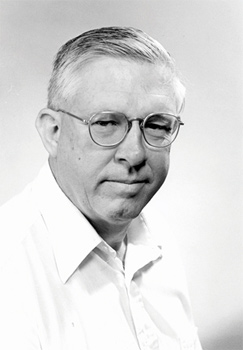W. Wallace Cleland facts for kids
Quick facts for kids
William Wallace Cleland
|
|
|---|---|
 |
|
| Born | January 6, 1930 |
| Died | March 6, 2013 (aged 83) |
| Alma mater | Oberlin College (A.B., 1950) University of Wisconsin (M.S., 1953) (Ph.D., 1955) |
| Known for | Enzyme kinetics and mechanism |
| Awards | Repligen Award |
| Scientific career | |
| Fields | Biochemistry |
| Institutions | University of Wisconsin |
William Wallace Cleland (born January 6, 1930 – died March 6, 2013) was a very important scientist. People often called him "Mo Cleland." He was a professor at the University of Wisconsin-Madison.
Professor Cleland studied biochemistry, which is the chemistry of living things. He focused on how enzymes work. Enzymes are like tiny helpers in our bodies. They make chemical reactions happen very fast. His work helped us understand how these important helpers do their jobs.
Contents
The Life of William Cleland
William Cleland was born in 1930 in Baltimore, Maryland. He loved learning from a young age. He went to Oberlin College and earned his first degree in 1950. Later, he continued his studies at the University of Wisconsin–Madison. There, he earned two more advanced degrees in 1953 and 1955.
Besides science, Professor Cleland had a fun hobby. He was a big fan of collecting stamps! This hobby is called Philately. He was so good at it that the Smithsonian Institution gave him a special award in 2008. This award was for his lifelong dedication to stamp collecting. William Cleland passed away in 2013.
Cleland's Amazing Career
After finishing his studies, Professor Cleland did more research at the University of Chicago. Then, he came back to the University of Wisconsin–Madison. He started as a professor there in 1959. Because of his great work, he quickly moved up. He became a full professor in 1966. Later, he held special professor titles, like J. Johnson Professor and Steenbock Professor.
Understanding Enzymes with Cleland
Professor Cleland's main work was about enzyme kinetics. This is the study of how fast enzymes work and what steps they take. He wanted to figure out exactly how enzymes help chemical reactions.
How Enzymes Work
Cleland was one of the first to study enzymes that use more than one starting material. He created a system to group different ways enzymes work. He also wrote down the math equations to describe these processes. This helped other scientists understand enzymes better. For example, he studied how an enzyme called creatine kinase works.
Computers and Science
Professor Cleland was also a pioneer in using computers for science. He wrote special computer programs. These programs helped scientists analyze data from enzyme experiments. He shared his programs with anyone who asked. This made it easier for many researchers to do their work.
Isotopes and Enzyme Clues
Later in his career, Cleland used a method called "kinetic isotope effects." This method uses special atoms called isotopes. By watching how these isotopes move, scientists can get clues about how enzymes speed up reactions. This helped uncover more secrets of enzyme action.
Cleland's Reagent
Professor Cleland also discovered a very useful chemical. It helps to break certain bonds in proteins. These bonds are called disulfide bonds. Because of his discovery, this chemical is often called "Cleland's reagent." It is still used by scientists today.
Awards and Special Recognition
Professor Cleland received many awards for his important work. Here are some of them:
- 1985 - He was chosen to be part of the National Academy of Sciences. This is a very high honor for scientists.
- 1986 - He received the Fulbright Senior Scholar Award.
- 1990 - He won the Merck Award from the American Society for Biochemistry and Molecular Biology.
- 1993 - He received the Alfred Bader Award from the American Chemical Society.
- 1995 - He was given the Repligen Corporation Award in Chemistry of Biological Processes.
- 1999 - He won the Stein and Moore Award from the Protein Society.
- 2008 - He received the Lifetime Achievement Award in Philately from the Smithsonian Institution for his stamp collecting.
- 2014 - A special science meeting, the 36th Steenbock Symposium, was held to honor his life and work.
 | Madam C. J. Walker |
 | Janet Emerson Bashen |
 | Annie Turnbo Malone |
 | Maggie L. Walker |

